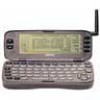Nokia 9000il Nokia 9000il User Guide in English - Page 46
Short messages
 |
View all Nokia 9000il manuals
Add to My Manuals
Save this manual to your list of manuals |
Page 46 highlights
Chapter 6 - Short messages 6-1 6. Short messages Activate the Short Message Service (SMS) application by pressing the button labeled "SMS" on the communicator interface keyboard. To send and receive SMS the following requirements must be met: • Short Message Service (SMS) must be supported by the network you are using. • Your SIM card must be activated for SMS. • You must store the Short Message Service Center (SMSC) phone number in the SMS application's settings. Your network operator may be able to send a special SMS to your communicator which will set the SMSC number for you. Contact your network operator for details. The Short Message Service enables you to send and receive short alphanumeric text messages of up to 160 characters over the GSM network. If the message is longer, it will be sent as several messages. The advantages of short messages are: sending is practically instantaneous, messages can be sent or received even during a voice or data call and messages can be read in any GSM mobile phone that has the capability. The SMSC (Short Message Service Center) will take care of delivering the message even if the receiving phone is off at the time of sending. The SMS main view shows the following folders plus the Document outbox. • Own texts - Texts that you have written. • Received messages - Messages you have received (see "Received messages" on page 6-5). • Standard messages - Your message templates (see "Standard messages" on page 6-5). • Business cards - All contact cards in the Contacts directory (see "Business cards" on page 6-6). • Info messages - Informational messages sent by the network (see "Info messages" on page 6-5). • Delivery reports - Information about the status of sent messages. • Document outbox - Described in Chapter 12 "Document outbox" on page 12-1. Note: You can only send short messages to phone numbers stored in Tel (GSM) fields. Be sure to write down the area code as well as the phone number. Menu Within the Own texts, Received messages, Info messages folders, the Menu command will open a pop-up box with the choices: Write message Rename Copy Move Create folder Menu options are standard for the Fax, SMS, Internet, and Notes applications. For more detailed information on Menu options, see Chapter 5 "Fax: Fax settings - Menu" on page 5-2. If any of these choices is not possible, the choice will be dimmed.















